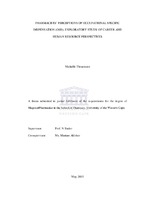| dc.description.abstract | Prior to 2007, South Africa’s government became concerned about the loss and inability to retain certain professionals in its employment. Health human resources were distributed in favour of the private sector and urban areas while rural areas survived on a meagre portion of health employees. In 2007, the government introduced a re-designed remuneration structure for individual skilled professions namely, Occupation Specific Dispensation (OSD), with the goal to attract and retain professionals. This study qualitatively explores the perceptions of public sector employment (PSE) by pharmacists to extract how OSD-policy may or may not be succeeding. It also investigates the opinions of pharmacists on the promotional structure of OSD and opportunity for career advancement (CA) as a possible indication of organisational commitment. Participants were recruited from four career streams in OSD’s structure, all employed in the Department of Health, Provincial Government of the Western Cape. In the first stage of data collection, one-on-one interviews were conducted with key-informants which consisted of policy specialists (n=2) and management (n=2). In the second stage, focus group interviews were conducted comprising of production and supervisory pharmacists (n=27). Sampling strategies encompassed purposive, snowball and stratified sampling to ensure saturation of data and provide comparisons between groups and sub-groups. Thematic analysis of interview transcripts was performed using inductive coding in the first stage and apriori coding in the second stage. Themes and sub-themes were “reflexed” onto Human Resource and Work Motivation Theory by engaging a three question reflexive framework to ensure consistency in the interpretation of results. Eleven major themes emerged: overlapping of salary grades; variety of positions; being a manager of professionals; envisioning promotion; pay versus responsibility; pay equity and expectancy; OSD and attraction; OSD and retention; over-time and after-hours remuneration; interpreting OSD; and using unions to negotiate policy for professionals. 41 sub-themes that emerged were positively, negatively or neutrally connected to perceptions of PSE or CA. Positive sub-themes of PSE is that OSD has “ensured that entry level positions are extremely attractive” and OSD is “attracting more junior pharmacists to management positions”. Negative sub-themes of PSE include that a “retention strategy for experienced pharmacists tends to be neglected” and “some work related factors may nullify retention strategies”. Negative or stagnant perceptions of PSE produce an image that fails to care for individual employee needs and tarnishes the image of public sector employment. Positive sub-themes of CA are that OSD now “permits individual freedom of career path choice” and OSD “has created a variety positions through a broadened post structure”. Negative subthemes of CA are that “experienced pharmacists stagnate in their career” and “supervisors have a lot more responsibilities but get paid the same as production pharmacists”. Since the perception of career mobility is related to organizational commitment and retention, negative perceptions of career advancement may result in apprehension to develop via promotion or career path change. This can lead to employee boredom, complacency or frustration of career ambitions and eventual loss of staff. Some aspects of OSD, such as overlapping of salary grades, should be addressed by policy-developers to ensure the successful accomplishment of policy goals. | en_US |

